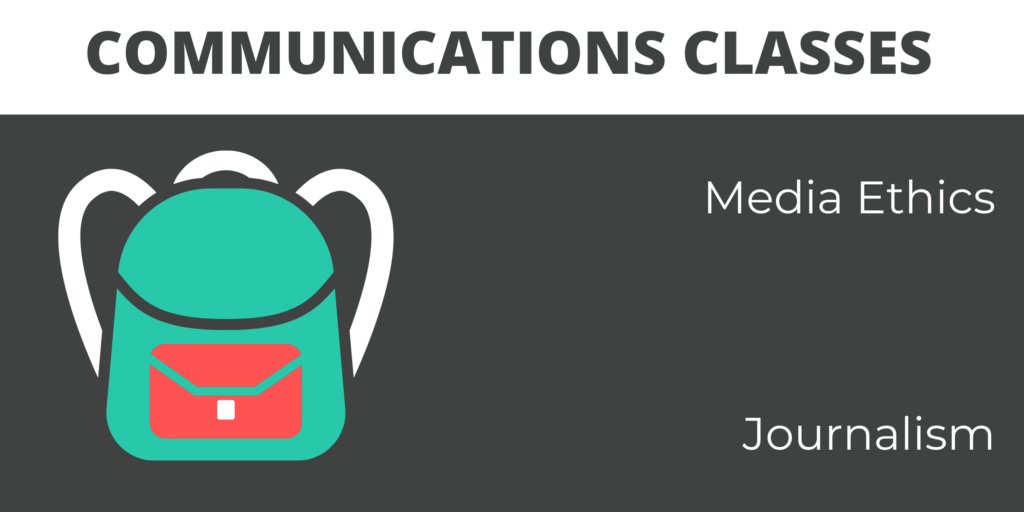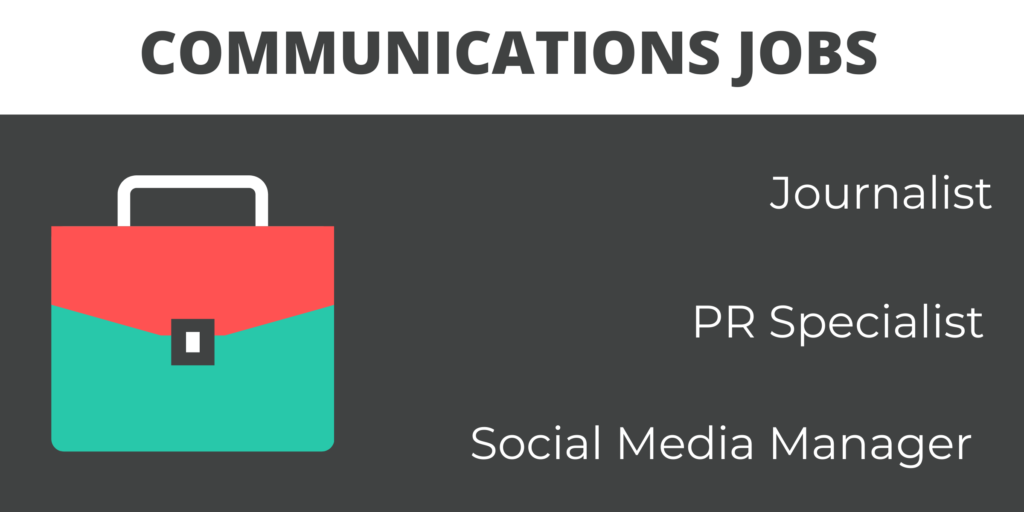You can have the best product in the world, and it won’t matter without communication.
In fact, large portions of what makes a product good are embedded in communication. Take software-as-a-service companies, their technology is only as good as their ability to inform developers and users how they can use it.Typically this takes the form of documentation, tutorials, and events where an ecosystem of users can exchange information, all communication-driven events.
In other large organizations, messaging can help organizations to avoid catastrophic public relations gaffs, or to position an organization on one side of an issue. This works both internally and externally. For example, a communications team within an organization can help to spread a message about diversity in hiring, ensuring better cohesion in hiring managers as well as a feeling of support for individuals who care about this cause.

If you find yourself drawn to helping to elucidate ideas to the public or within an organization, and particularly in how these efforts can directly support organizational goals, then communications could be a great way for you to join the business world.
Here at GreatBusinessSchools, we’ve covered a wide range of business degree-related topics. Some of our related content that you may find interesting includes:
- The Best Online Master’s Degrees in Communications
- The Best Online Master’s Degrees in Marketing
- The Best Online Marketing MBA Degrees
- What Can I Do With a Marketing Degree?
- What Can I Do With an MBA?
Tables of Contents:
- Categories of Business Communications Tasks
- What Communications Degrees Can Help Me Start A Business Career?
- What Business Careers Can I Gain With a Communications Degree?
Categories of Business Communications Tasks
As we briefly touched on in the introduction, communications can serve a wide variety of purposes and can be pointed at many audiences within a business context. Though most communications jobs will focus on more than one of these areas, some of the major types of communications within business include the following.

Strategic communications is a monicker that has gained popularity over the last two decades. While all communications should be strategic to a degree, strategic communications tasks bring strategy to the forefront of communicating. Rather than focusing on the tactics of how communications will be done, strategic communication planning takes a step back and looks at the highest level of strategy at play in an organization, and then figures out what communications tasks support these strategic initiatives.
Typically strategic communications is more of a planning activity. Though it may involve collecting data about stakeholder values or the efficacy of past communications projects.
Internal communications are communications that don’t need to reach the world outside of an organization. This opens up many additional channels for spreading your information. This focus also lowers the importance that you “catch” or “keep” a viewers attention as in many cases team members have a shared interest already of promoting organizational excellence. Internal communications is often interdisciplinary, you may team up with one branch of your organization to explain what they’ve been working on, or team up with one senior leader to help support one internal initiative.
External Communications is labelled thus only in comparison to internal communications. A vast majority of communications are external, and this is perhaps the most broad category of communications. External communications can be marketing efforts in support of a brand, public relations efforts, or reaching out to specific stakeholders like users of a product. Typically communications exists at the very top of a marketing funnel, or circles around brand awareness building.

Stakeholder Management will mean different things in different industries, but typically a stakeholder is someone with a vested interest in seeing a product or service take a certain shape. Essentially, stakeholders are affected by a product or service. This can mean a town local to a manufacturing plant being built, or a neighborhood next to a concert venue, or a group of technicians that utilize a tool in their work. Broadly speaking there are two types of stakeholder management within communication. One is seeking to convince stakeholders of something, or instill confidence. And the second involves creating a quality community to retain existing customers or users.
Public Relations deals with the broadest of communications audiences, the general public. Public relations can be built upon to craft an image of an organization in the public audience. For example, that pharmaceutical companies are striving to “make the world a better place.” They can highlight pro bono or charity projects. And public relations can also be responsive, or dealing with an unfortunate event. For example, hordes of PR professionals are involved whenever an ecological disaster is caused by an organization. These individuals both try to minimize damage to the organization’s reputation as well as spread knowledge of what is being done about the event.
Marketing is the branch of communications most directly tied to bringing in new customers. This form of communications seeks to support the creation of “funnels” in which a potential customer may be stepped from awareness of a problem through comparison of options and eventual conversion. While there are many additional aspects to marketing, including running of ads, data analytics, multimedia creation, building of websites, and hosting of events, communications lies at the heart of nearly all of these tasks.

Here at GreatBusinessSchools, we’ve covered a wide range of business degree-related topics. Some of our related content that you may find interesting includes:
- The Best Online Master’s Degrees in Communications
- The Best Online Master’s Degrees in Marketing
- The Best Online Marketing MBA Degrees
- What Can I Do With a Marketing Degree?
- What Can I Do With an MBA?
What Communications Degrees Can Help Me Start A Business Career?
First and foremost, a career in communications can be entered by nearly any graduate who has a penchant for communication, is articulate, a strategic thinker, and good at writing.

This means that graduates from backgrounds ranging from the liberal arts, social sciences, and business regularly make high quality communications professionals. If you’re seeking to enter communications in a field which is somewhat technical, it can be helpful for individuals to gain domain knowledge at the undergraduate level to go on to better communicate about this domain. For example, a chemical engineering graduate going on to become a communications expert for a chemical sciences company.
There are of course, more direct ways to enter into a communications role. These include the following degrees:
Bachelors in communications are a growing option for universities with business schools. One of the benefits of pursuing a communications-specific degree at the undergraduate level is that these degree programs can expose you to a core of communication-specific courses while also being quite general and letting you gain mastery in a selection of other topics. This is important if you would like to both gain expertise in business, writing, marketing, or a technical field at the same time with gaining introductory communications knowledge.
Bachelor’s degrees in communications require 120 credit hours, and most commonly require four years to complete.

Master’s in strategic communications serve two primary purposes. The first is to enable individuals already working in communications to advance to the highest levels of communications roles. Strategic communications typically occur in tandem with meetings with the management and at time executives. A master’s in strategic communications can help an individual who knows communications tactics to be able to bridge the gap between senior management and communications efforts. A second purpose for a master’s in strategic communication is for an individual with a non-communications background to get into the communications field. With a master’s degree one can typically jump into a field like communications at higher than the entry level.
Master’s degrees in strategic communication are often offered online and can at times be completed in as little as a year and a half of study.
Bachelor’s in Digital Media or Marketing can help individual break into one subset of communications, marketing. Additionally, they can prep individuals with additional skillsets from marketing that they can carry into the ranks of traditional communications. These days, digitally-focused degrees have some of the highest ability to push positive impact for future employers, and a focus on digital marketing can lead to many roles right out of school.
Bachelor’s degrees in digital media or marketing typically require 120 credit hours, and most commonly require four years to complete.
Master’s in Marketing are degrees primarily offered by business schools that allow students to dive more deeply into one subset of marketing, as well as to retool with general graduate-level marketing coursework if their undergraduate major was in another field of study. Common specialization areas in master’s in marketing include digital marketing, public relations, strategic communications, analytics, and more. Typically master’s in marketing are built more around hands-on projects and building a real-world portfolio than a traditional master’s-level thesis.
Master’s in marketing vary in the time they require to complete, but many may be completed in around 2 years.
Master’s in Business Administration degrees are one of the most universally recognized and rewarded degree types within business. Studies have shown that nearly half of corporate executive hold an MBA. Additionally, many MBAs offer a range of concentration types including marketing, communications, strategic communications, and digital media. Each of these concentration types can help a degree recipient to gain valuable communications techniques. Additionally, the core coursework within an masters in business administration can help you either to fill other roles or to move up the corporate ladder with managerial and strategic know-how.

Master’s in Public Relations degrees are almost entirely about communication, but not in a marketing sense. For individuals wishing to deep dive into one of the most important messaging roles in many private and public organizations, PR can be a great choice. Individuals in this role learn how to carefully craft a narrative studying the plethora of real world examples of savvy (and unsavvy) public relations moves. Public relations is also one of the best degrees on this list if one is potentially interested in working in both public or private settings, or if one is interested in politics at some point in the future.
Here at GreatBusinessSchools, we’ve covered a wide range of business degree-related topics. Some of our related content that you may find interesting includes:
- The Best Online Master’s Degrees in Communications
- The Best Online Master’s Degrees in Marketing
- The Best Online Marketing MBA Degrees
- What Can I Do With a Marketing Degree?
- What Can I Do With an MBA?
What Business Careers Can I Gain With a Communications Degree?
There is some degree of communications in many jobs, but a handful of jobs are primarily about communications. Below we’ve worked through some of the most communications-heavy jobs available, and those that you can enter into with a communications degree listed above.
Copywriter is a position within most marketing, public relations, communications, and product disciplines. These individuals take creative briefs and craft messaging on everything from toothpaste labels, to bus stops, to websites. Individuals tend to enter into copywriting roles with degrees that are writing heavy, but not necessarily a communications degree. For example, many humanities and social science graduates find jobs in copywriting. To advance in the field, individuals must have experience or gain a graduate degree in a field related to communications, writing, or marketing.
Average copywriter salary: $58,465.
Content Marketers are similar to copywriters, but may help with the production of many media forms and will primarily work in online settings. Content marketing is also a more specific type of messaging as opposed to copywriters in that media produced by content marketers is primarily marketing. The central aim of content marketing is to guide individuals through their buying journey by providing value. Additional objectives may include brand awareness, public relations, and enhancing user experience.
Average content marketer salary: $63,725.
Marketing Manager is a position with drastically ranging responsibilities depending on which organization you hope to work at. In some roles, marketing management involves hands-on implementation or creation of digital assets, designs, web pages, or videos. In other settings, marketing managers are largely strategic, and help to guide the implementation of communications deliverables. In still others, marketing managers may be more engaged with product creation and may help to host focus groups, interview clients or the public about their needs, and so forth.
Typically marketing manager positions are gained through working your way up from an entry-level marketing-related job, or by attending a graduate degree program related to marketing.
Average marketing manager salary: $106,168.
Public Relations Manager typically focus on communications regarding the public perception of a brand, increasing brand awareness, or hosting quality events to build an ecosystem of followers. Some of the most valued skill sets that public relations managers can provide are connections to media professionals and journalists to gain coverage for their client, a knowledge of important events within an ecosystem, and the ability to handle a public relations crisis to escalate and divert attention away from an employer.
Average public relations manager salary: $110,845.
Director of Communications roles are less common than chief marketing officer roles, but in some organizations that have a distinct non-marketing-related communications focus, a director of communications is a likely role to find. These individuals work at the senior management or executive levels depending on corporate structure, and help to connect the highest level of organization strategy to communications projects and programs. More than any other individual position on this list, director of communications roles are likelier to require or prefer a graduate-level degree strictly related to communications.
Average director of communications salary: $82,896.
Internal Communications Specialists may actually hold a range of titles. Corporate coaches, that help with educational programs for employees at large organizations, are essentially internal communications educational specialists. Human resources communicators are often primarily reaching out to internal audiences. Organizations that have positions like Chief of Corporate Culture are also primarily internal communication roles.
Average internal communications specialist salary: $63,886.
Chief Marketing Officer is the single executive level role we’ve singled out, though there are definitely some communications professionals that do make it to executive-level positions less related to communications. Seasoned and driven communications professionals are actually great “fits” for chief marketing officer roles given that communication requires the crafting of a coherent narrative and direction with an eye on strategy. While communications professionals may need to spend some time catching up in other areas of marketing, messaging heavy CMO roles can be a great fit for communications professionals.
Average chief marketing officer salary: $173,797.
Here at GreatBusinessSchools, we’ve covered a wide range of business degree-related topics. Some of our related content that you may find interesting includes:
- The Best Online Master’s Degrees in Communications
- The Best Online Master’s Degrees in Marketing
- The Best Online Marketing MBA Degrees
- What Can I Do With a Marketing Degree?
- What Can I Do With an MBA?
Carrie Morris
Author
Warren Dahl
Editor-in-Chief

